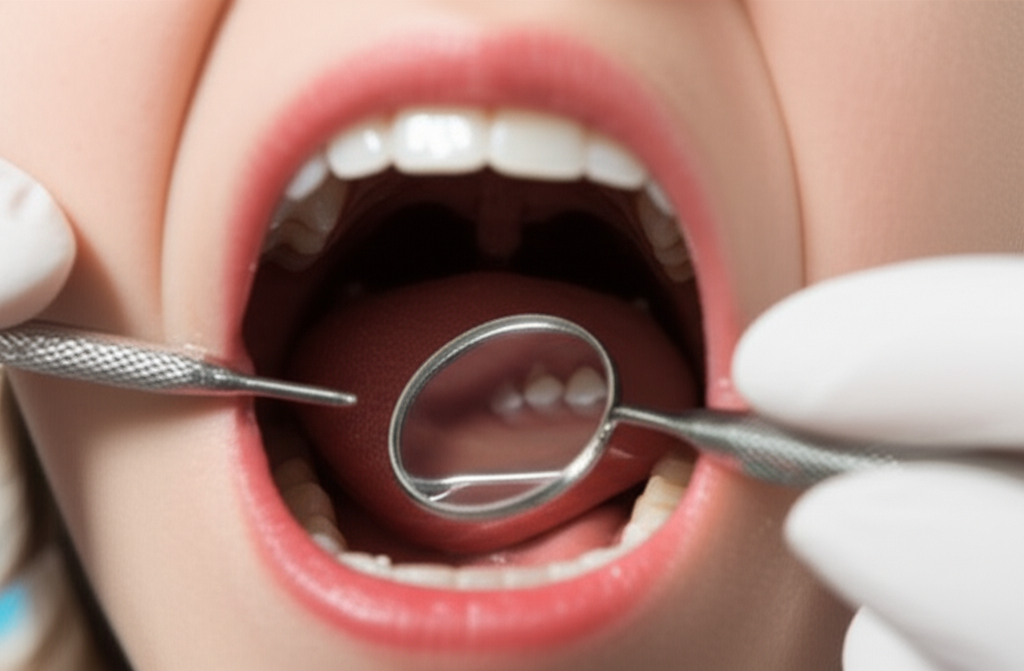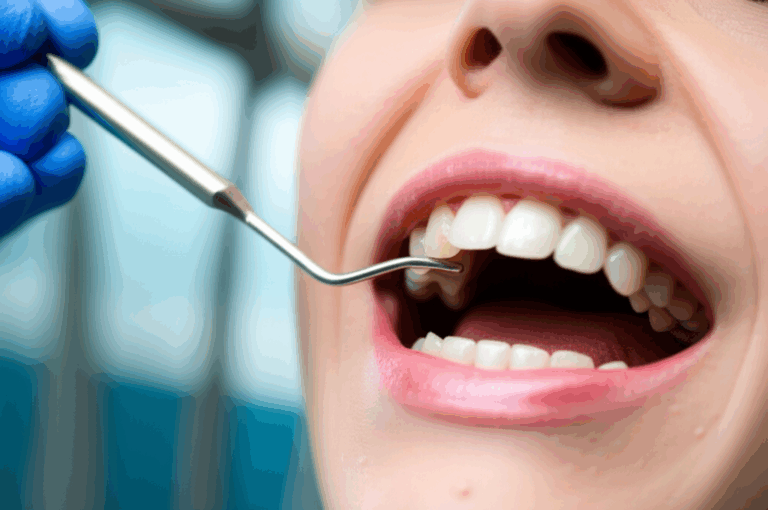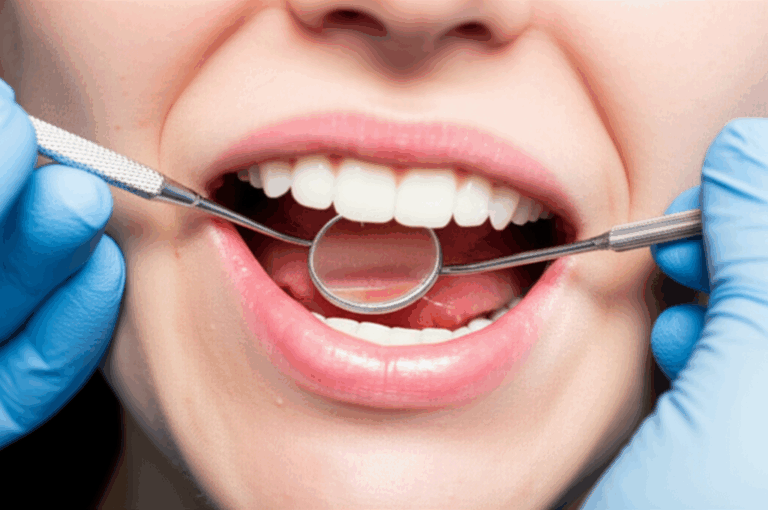
Can a Dentist Check for Tonsil Stones? Your Guide to Oral & Throat Health
Do you ever feel something strange at the back of your throat, like a small lump or a bad taste that won’t go away? Are you stuck wondering if your dentist can check for tonsil stones? You’re in the right spot. This article explains exactly what dentists look for, how they help with tonsil stones, and what steps you should take if you notice them. By the end, you’ll know how to work with your dentist for better throat and mouth health.
Table of Contents
What Are Tonsil Stones and Why Should You Care?
Let’s start easy. Tonsil stones (also called tonsilloliths) are small, hard, white or yellow bits that show up on your tonsils. These stones are made of bacteria, pieces of food, mucus, and stuff like calcium. Most people don’t even notice them, but they can give you problems like bad breath, a sore throat, or make it hard to swallow.
Why does this matter to you? Because these might secretly be the reason behind those annoying mouth problems. The interesting part: your normal trip to the dentist could be the first time anyone spots them. That means your mouth health and the health of your throat are connected.
Does a Dentist Really Check for Tonsil Stones?
Yes—dentists often look out for tonsil stones when you go in for a check-up. Here’s why. When you get your teeth cleaned or checked, the dentist isn’t just watching for holes in your teeth or gum problems. They also check your mouth area, your tongue, the soft part and hard part at the top of your mouth, and even your tonsils. Special tools like a mirror or bright light help them look deeper.
A lot of people first learn about their tonsil stones from the dentist, not the doctor. Dentists learn to spot things in your mouth and throat you might not notice yourself. Even if you feel nothing, a dentist sometimes can see those little white bumps on your tonsils.
But why do dentists even care to look for tonsil stones? Because things like bad breath, a sore throat, or strange bumps on your tonsils could point to something else going on. Tonsil stones are one of those things.
How Do Dentists Spot Tonsil Stones During a Check-Up?
So, what do dentists actually do to find tonsil stones? They use their eyes, their basic tools, and what they know from experience. Usually, they do things like this:
Dentists might also see stuff like lots of coughing, runny nose problems, or swollen tonsils. All of this gives them more ideas about whether you might have tonsil stones.
Can a Dentist Diagnose or Just Suspect Tonsil Stones?
Here’s an important one. Can a dentist really say you have tonsil stones, or are they just guessing? If the stone is big enough or easy to see, a dentist can tell just by looking.
Sometimes, little stones hide in the deep pockets of your tonsils. In these cases, a dentist might just think you might have stones, especially if you have bad breath, a sore throat, or something feels off. Dentists might use things like a big mouth X-ray, which sometimes shows stones by luck.
But dentists are pretty good at knowing if it’s a tonsil stone or not. They know the difference between:
- Tonsil stones and strep throat
- Tonsil stones and left-over food
- Tonsil stones, and a plain tonsil infection or mouth fungus
If it looks more serious, like a big pain bump or pus pocket (abscess), your dentist will send you to the right kind of doctor.
What’s the Difference Between Tonsil Stones and Other Throat Problems?
Tonsil stones can confuse people. You might think, Do I have strep throat, sore tonsils, or is it something else? Here’s a quick cheat sheet:
| Condition | Main Symptoms | How Dentist Can Tell |
|---|---|---|
| Tonsil Stones | Bad breath, white/yellow bump, sore throat | Hard bump, mostly on or in tonsil pockets |
| Strep Throat | Painful red throat, fever, pus sometimes | Usually no hard bump; tests can show the germs |
| Tonsillitis | Big, red, sore tonsils, maybe pus | Swollen, but not hard bumps |
| Oral Thrush | White stuff you can wipe off | Not hard, comes off when wiped |
Dentists use what they see, your answers, and their own knowledge to figure it out. If your problem keeps coming or the answer isn’t clear, they might send you for a throat swab or special pictures.
Will a Dentist Remove Tonsil Stones or Refer Me?
Can your dentist just take out your tonsil stone? Sometimes, yes. If the tonsil stone is near the edge and not too big, a dentist might gently move it with a tool or show you how to rinse your mouth with salt water or use a gentle squirter (oral irrigator).
But remember: Dentists won’t do any big tonsil surgery, and they won’t try to take out big, deep, or tricky stones. It can hurt, make you bleed, or cause more trouble. For tough stones, your dentist will send you to an ENT (Ear, Nose, and Throat) doctor. That’s the person that does special stuff like lasers, coblation, or even takes out your tonsils if things get bad.
Even if they don’t pull it out, dentists can help by sharing tips like:
- Rinsing with salt water
- Brushing and flossing every day
- Scraping your tongue
- Drinking enough water
For help with things like dental devices, see what a china dental lab can do. Good mouth cleaning habits can help stop these stones before they start.
When Should I See an ENT Specialist?
Sometimes you need more than just the dentist. If any of these happen, you should see an ENT doctor:
- Tonsil stones keep coming back (happen again and again)
- Bad pain that just won’t go away
- Can’t swallow or breathe right
- There’s blood on your tonsil
- The stone is big or stuck deep inside
- You keep coughing or your voice sounds funny
An ENT doctor can use better tools to look, or take the stones out. If it’s really bad, they might suggest taking out your tonsils (tonsil removal surgery).
Common Symptoms: Could It Be Tonsil Stones?
Lots of people have tonsil stones and don’t even know it. Others might notice these clues:
Main Signs of Tonsil Stones:
- Bad breath
- Sore throat
- White or yellowish dots on tonsils
- Metal taste in mouth
- Feeling like something’s stuck in your throat
- Swollen tonsils or strange feeling
Less Common Signs:
- Ear ache or fullness (even if your ear is fine!)
- Hard to swallow
- Keep coughing or clearing your throat
- Voice sounds strange
- Little bit of blood if a stone comes out
If you see any of these—especially if they stay for a while—let your dentist know.
How Do Tonsil Stones Form and What Causes Them?
It might surprise you that small things like these can be such a headache. Here’s how it works: Our tonsils have tiny pits called crypts. Food bits, dead skin, mucus, and mouth germs get stuck in these holes. Over time, they can get hard and turn into stones.
What Makes Tonsil Stones More Likely:
- Deep holes in your tonsils: More “pockets” means more things can get stuck.
- Sore tonsils a lot: Bigger tonsils = more small holes for stuff to hide in.
- Not keeping your mouth clean: Not brushing, flossing, or cleaning your tongue lets germs grow.
- Nose problems or runny nose drip: More mucus = more chances for stones.
- Dry mouth: Less spit means less natural cleaning at the back of your mouth.
Some health problems, like acid reflux (GERD), can also help stones show up because they can make your throat and tonsils sore.
Prevention: How to Stop Tonsil Stones Before They Start
The good part? You can do a lot to keep tonsil stones away! Try these simple things:
- Brush your teeth twice a day
- Floss at night to get out stuck food
- Clean your tongue to wipe off germs
- Rinse with salt water or mouthwash (use ones without alcohol so your mouth doesn’t get dry)
- Drink plenty of water
- Treat nose drip or allergies if you have them
It’s also smart to keep up with regular dentist visits. Dentists who use special tools—like digital X-rays—can see early signs and help you keep your mouth and throat in shape.
Next Steps if You Suspect Tonsil Stones
Here’s what to do if you think you might have a tonsil stone:
For custom dental devices or if your mouth has other problems, try a night guard dental lab for more help with your daily mouth care.
Frequently Asked Questions (FAQs)
Q: Are tonsil stones dangerous?
A: Tonsil stones are almost never dangerous, but they can make your breath smell bad or your mouth feel gross. Rarely, if they’re really big or get infected, they might hurt or get you sick—see a doctor if that happens.
Q: Can I remove tonsil stones myself?
A: Sometimes you can get out small, easy-to-see stones by rinsing or using a soft cotton swab. But DON’T poke deep or use sharp stuff! If it won’t come out or hurts, see your dentist or doctor.
Q: Do tonsil stones always cause bad breath?
A: Not always, but they often cause bad breath. If your breath always smells bad, tell your dentist.
Q: Can X-rays show tonsil stones?
A: Yes, sometimes big mouth X-rays (panoramic) that dentists use can catch hard tonsil stones, even if you can’t see them.
Key Takeaways
- Dentists look for tonsil stones at normal mouth check-ups—even if you have no symptoms.
- Usual signs are bad breath, white dots on your tonsils, sore throat, or feeling like something’s stuck in your throat.
- Dentists can share home tips, help with small stone removal, or send you to an ENT if you need more help.
- Keeping your mouth clean every day (brushing, flossing, cleaning your tongue) and drinking water are the best ways to stop stones from showing up.
- Write down what you feel and tell your dentist, it helps you get better care!
- Dentists and other doctors work together for your mouth and throat health, so you get the best help possible.
Always remember, your dentist takes care of way more than just your teeth— they help keep your whole mouth, throat, and breath fresh and healthy!
References:
- Sezer, B., et al., Tonsilloliths: A case series of 27 patients, 2017.
- Mesko, J. A., et al., Tonsilloliths: Incidence and clinical features, 2014.
- Ram, S., & Chintala, S. D., Panoramic radiographic features of tonsilloliths, 2012.
- Prasanna, N., et al., Prevalence of Tonsilloliths on Panoramic Radiographs, 2013.
- Scully, C., & Rosenberg, M., Halitosis: aetiology, diagnosis and treatment, 2002.
- Rio, A. C., et al., Tonsilloliths and Halitosis, 2008.
If you want to know more about how modern dental labs help your dental care, take a look at a dental ceramics lab and see how dentists can help keep your smile—and your breath—fresh!








